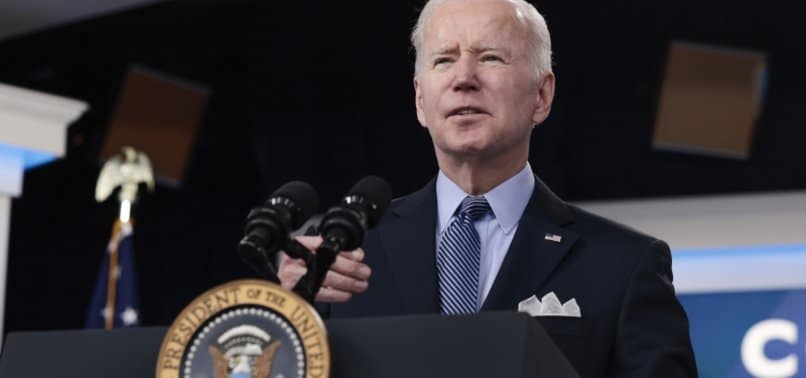Joe Biden orders release of 1 million barrels of oil per day from US strategic reserve for six months

Washington: US President Joe Biden on Thursday announced to release 1 million barrels of oil per day from the nation’s strategic petroleum reserve for the next six months as part his efforts to keep the oil prices under control which have been spiralling in the aftermath of the Russian invasion of Ukraine.
“I’m authorizing the release of 1 million barrels per day for the next six months — over 180 million barrels from the Strategic Petroleum Reserve,” Biden said making the announcement in this regard.
The revenue generated from selling the oil would be used to restock the Strategic Petroleum Reserve when prices are lower so that the country is ready for future emergencies, he said.
Biden said he has been talking to other allies and partners around the world.
“Already, we have commitments from other countries to release tens of millions of additional barrels into the market. Together, our combined efforts will supply well over a million barrels a day — nations coming together to deny Putin the ability to weaponize his energy resources against American families, and families and democracies around the world,” he said.
The president also announced plans about declaring real American energy independence in the long term so that the US never has to deal with this problem again.
“Ultimately, we and the whole world need to reduce our dependence on fossil fuels altogether. We need to choose long-term security over energy and climate vulnerability. We need to double down on our commitment to clean energy and tackling the climate crisis with our partners and allies around the world,” he said.
Later National Economic Council Director Brian Deese told reporters that there are currently 568 million barrels in the reserve, which is in four locations across southern Louisiana and Texas.
“The President authorized this reserve under his extraordinary emergency powers associated with supply disruptions, which we have seen in the market are associated with Putin’s unjustified actions and the reaction from the United States and allies in the world in no longer purchasing Russian oil,” Deese said.
According to him, the duration of six months was designed and calibrated to operate a medium-term bridge to the period where they anticipate and expect US production to come back online.
“The most estimates based on commitments by companies are that we will see an additional million barrels a day from US industry by about the end of the third quarter of this year. So, the time period operates as a bridge until then,” he said.
The United States, he said, has been in touch with several countries including India on the release of strategic reserves.
“Our conversations with all countries that have reserves are similar in encouraging them to participate and to contribute, consistent with their available stocks and their circumstances,” Dees said.
“We have seen to date a quite extraordinary willingness to participate — including IEA and non-IEA members — to participate in those coordinated releases, including the Indian government to date. So, the work of diplomacy and engagement with our allies and partners is aimed to make sure that that continues,” he said.
Biden also signed an executive order authorizing the Defense Production Act for usage for the critical materials that go into large-capacity batteries. Biden took this action under Title 3 of the Defense Production Act, which provides for prioritizing and subsidizing the production domestically of key inputs that are critical to national defence.
This follows a study by the Secretary of Defense Lloyd Austin which identified that large-capacity batteries are critical to the national defence and the components that go into them, including lithium and nickel, cobalt, graphite, manganese.
“My guess is that’s the first time in the White House briefing room someone has said ‘manganese.’ These are critical minerals. And we are currently vulnerable to unreliable supply chains, which affects our national security. It also affects our economic security as well,” he said.





